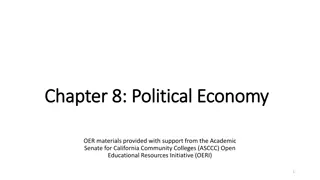Understanding Gramsci's Political Theory and its Relevance Today
Gramsci's political theory, focusing on concepts such as hegemony, historical bloc, and the role of intellectuals, offers valuable insights into contemporary political challenges. Explored through the lenses of Prof. Ken Spours and Stuart Hall's analytical tradition, this analysis sheds light on Conservative political hegemony, challenges for the Progressive Left, and the need for a broader understanding of politics. Gramsci's life, key concepts, and applicability in understanding emerging political movements, such as Thatcherism and New Labour, highlight the ongoing relevance of his work in navigating contemporary political landscapes.
Download Presentation

Please find below an Image/Link to download the presentation.
The content on the website is provided AS IS for your information and personal use only. It may not be sold, licensed, or shared on other websites without obtaining consent from the author. Download presentation by click this link. If you encounter any issues during the download, it is possible that the publisher has removed the file from their server.
E N D
Presentation Transcript
Gramsci in 1916 Johnson and Conservative political hegemony: a Gramscian analysis Prof. Ken Spours UCL Institute of Education & Capital Normal University, Beijing June 2021
Wicked problem for the Progressive Left a durable Conservative Political Bloc An exploration of Tory hegemony and challenges for the Progressive Left
Part 1. Gramscis political life, his key concepts & the Stuart Hall analytical tradition
Antonio Gramsci his life and politics Born 1891 in Sardinia, Italy Joined Partito Socialista Italiano (PSI) in 1913 Involved with the Turin Workers Councils (1920) and published weekly newspaper L'Ordine Nuovo (The New Order) Helped form Partito CommunistaItaliano (PCI) in 1921, became General Secretary in 1924 Backed Anti-Fascist Popular Front Arditi del Popolo in 1921 Member of Parliament 1924 for PCI (Fascists already controlled Italian Government) Arrested in 1926 the Prosecutor stated "For twenty years we must stop this brain from functioning". In prison Gramsci wrote 30 The Prison Notebooks 3000 pages of writing and analysis which were published in Italian in the 1950s and English in early 1970s.
10 key Gramscian concepts a Marxist political theory (six the focus of this talk) Hegemony Historical Bloc State/Civil Society and the Integral State Political Party as Modern Prince Traditional and Organic Intellectuals Common Sense; Good Sense and Philosophy of Praxis Passive Revolution War of Position and War of Manouvre Conjunctural and organic developments Americanism and Fordism
The Stuart Hall Gramscian analytical tradition Stuart Hall applied Gramsci s political theory to understand emerging Thatcherism (The Great Moving Right Show - Marxism Today - 1979) and then New Labour and the concept of the (Double Shuffle Soundings 2003) Expanded politics One of the most important things that Gramsci has done for us is to give us is a profoundly expanded conception of what politics itself is like Analysis of the conjuncture Gramsci directs our attention unswervingly to what is specific and different about this moment. It s a lesson which the Left in Britain has yet to learn. It still feels more left-wing to say the old ruling-class politics goes on in the same old way. (Stuart Hall, Gramsci and Us, 1987)
Part 2. Johnsonism and the remaking of Conservative hegemony
Key elements of Tory hegemony Johnsonism Shapeshifting - the Right adapts much faster than the Left Johnsonism is latest episode in Conservative shapeshifting - preceded by Cameron s liberal conservatism (2005-2016) and May s soft nationalism (2016-2019) The Right reframes the political environment - creating Brexit Window - the patient political and ideological war of position that was followed in the 2019 election period war of manoeuvre summed up in the simple but resonant slogan Get Brexit Done role of Cummings Co-option of Faragism and formation of the Regressive Alliance to cement 40 per cent plus electoral Bloc - again role of Cummings Superfically coherent narratives around national freedom to appeal to common sense - Global Britain, taking back control, levelling up, people s priorities to keep the social and political Bloc together
Johnsonism as a Conservative Double Shuffle Dominant strands drive regressive political change Neoliberal deregulation reducing costs for capital Populist English nationalism and nativism culture wars to polarise social and political opinion Authoritarianism and anti-democratic strategies to cement electoral advantage Subordinate strands extend political appeal and consolidate Red Wall gains Mild Keynesianism levelling up and investment away from London Promises of modest public spending on the NHS, policing and schools Rhetoric of One Nation Conservatism Johnson the shapeshifter persona and passive revolution Embodies both the dominant and subordinate strands and changes the combination at will he is a practitioner of Passive Revolution
Tory hegemony - tensions and contradictions Short-term Tory Bloc has fragilities due to inbuilt tensions between investment strategy and neoliberal austerity Brexit defined political bloc at odds with important sections of Capital Johnsonism and the end of the Union? Parts of the Tory Bloc not really interested in Scotland or Wales Possible tensions with Democratic US administration over NI and international aid cuts Longer-term Tory social bloc incapable of modernization dependency on older voting bloc The wrong end of new cultural, economic and environmental thinking the long-term rise of liberal and radical thought But Ideological and political agility means that some of these short-term contradictions might not be realised
Why has the Left been repeatedly defeated? Defeat is not simply down to an imbalance of economic and political forces It is also the result of the Left not thinking in a strategic political way weaknesses of social democracy and the socialist left Little interest in political theory, the nature of the conjuncture and even less interest in what the adversary has done right on the terrain of politics Importance of understanding the different dimensions of Conservative hegemony, matching these but not imitating the Tory project
Counter-hegemony - can there be a Progressive Double Shuffle? Dimensions of hegemony Conservative Progressive Dominant narrative Populist narrative Global Britain (Empire 2.0), English nationalism Deep change narrative - inter-dependency of nations tackling climate change, pandemics, social inequalities Social and Political Bloc Regressive Alliance Progressive Alliance social and political Combinational Politics Regressive Double Shuffle dominant conservatism and subordinate modernisation (levelling up) Progressive Double Shuffle dominant - democratic modernization and subordinate - traditional Progressive Double Shuffle? Democracy and participation Authoritarian and anti-democratic strategy Democratisation strategy including electoral reform, citizens assemblies Leadership Shapeshifting Political persona embodies the Progressive Double Shuffle Change strategy Passive revolution adaptation Radical evolution in participatory direction























